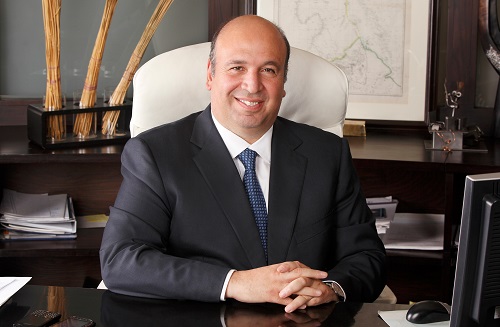
- Qalaa Holdings (Finance)
“[You have to] balance short-term needs with long-term opportunities, making sure that you don’t sacrifice the future, because it’s very easy to sacrifice the future under stress.”
Summary
Dr. Ahmed Heikal is Chairman and Founder of Qalaa Holdings, a leading investment company with headquarters in Cairo, Egypt. Founded as Citadel Capital in 2004, Qalaa Holdings invests in sectors that span energy and infrastructure, as well as logistics, mining and agri-foods. Dr. Heikal begins the interview by discussing his upbringing and early education. As the son of Mohamed Hassanein Heikal, a prominent journalist and commentator, Dr. Heikal notes how from an early age he observed “the interface of politics, journalism and later also business.” After pursing a B.Sc. in Mechanical Design and Production at Cairo University, he obtained a Master’s degree and PhD in Industrial Engineering & Engineering Management from Stanford University. He notes how the entrepreneurial spirit that he perceived in the United States encouraged him to shift away from a purely engineering-related career and towards one focused on business and finance.
Returning to Egypt after completing his PhD in 1991, he joined his uncle at a boutique advisory firm named EFG (which became EFG Hermes in 1996). Soon after joining, Dr. Heikal explains how he saw an opportunity to transform the firm into an investment company. He outlines the process of convincing the Chairman and EFG leadership at the time to move forward with his vision. He notes how “the reason why they accepted my argument […] was because the first foreign asset managers [were] coming to Egypt to make a transaction [and] EFG got a commission from it of around 260,000 Egyptian pounds, which at the time was around $70,000.” As the investment bank grew, Dr. Heikal underscores how important access to foreign capital was in order to raise funds, particularly because of the relatively smaller size of Egypt’s economy at the time.
Dr. Heikal continues the interview by detailing his transition from investment banking with EFG to a private equity model with the founding of Citadel Capital (now Qalaa Holdings) in the early 2000s. He explains that he wanted to “be one of the principals of the business,” describing how the new firm raised initial capital by investing in a profitable group of cement and construction companies. When Citadel Capital later became Qalaa Holdings in 2007, Dr. Heikal articulates how he decided to pursue greenfield development – investments in new ventures from the ground up with large infrastructure projects such as Egyptian Refining Company (ERC). The shift towards greenfields had occurred just before the global financial crisis in 2008, a period that Dr. Heikal describes as “a very terrible time, because we had committed the cardinal sin of investing behind a greenfield without reaching a financial close.” He details the actions taken to manage the crisis, which included reducing overheads and lending from personal savings.
Speaking more broadly about managing a company under periods of financial stress, Dr. Heikal argues that one must strike a balance, “[attending] to your employees to make sure they are staying put [and making sure] that in some cases, your capital allocation is extremely clever and in the right place.” He views Qalaa Holdings as having struck this balance during times of political and financial instability associated with the Egyptian revolution and political crisis of the early 2010s. Moving onto the main challenges he views Egypt facing today, Dr. Heikal articulates that “in order for a country to move forward, it has to produce.” He views the production of goods and services in addition to knowledge and ideas as fundamental to further development. All of this, as he explains, requires a stable work ethic and steady law enforcement. In addition to law enforcement, Dr. Heikal sees a role for the government alongside the private sector, particularly when private companies do not become involved in projects with a high-risk profile.
To conclude the interview, Dr. Heikal speaks about the educational and development programs that both Qalaa and its subsidiary companies such as ERC have instituted. Programs such as the Qalaa Holdings Scholarship Foundation support students’ education by financing advanced degrees that allow for Egyptian youth to contribute to sectors important to the country’s development. In addition to discussing the goals of the foundation, Dr. Heikal reflects on the process of building businesses in a context such as Egypt’s, which can greatly differ from settings such as the U.S., that has “certain things where you can tick the box regarding stability.” He thus explains the importance of trading carefully, and of keeping an eye on the outside environment that can affect business.
Video Clips by Topic
Start-up
Dr. Ahmed Heikal, Chairman and Founder of Qalaa Holdings, describes how the initial capital raised to start the firm was applied to profitable investments in cement and construction companies.
Building Brands
Dr. Ahmed Heikal, Chairman and Founder of Qalaa Holdings, explains how building businesses requires a skillset that involves accounting for external pressures, particularly in the context of emerging markets.
Social Impact
Dr. Ahmed Heikal, Chaiman and Founder of Qalaa Holdings, speaks about the firm's foundation, in addition to outlining other education and development programs instituted by subsidiaries such as ERC (Egyptian Refining Company).
Additional Resources
- "Qalaa Holdings Main Website."
- Malak Fouad. "Dr. Ahmed Heikal - What I Did Next." A&T Media, 16 May, 2022.
- Ahmed Heikal. "Qalaa Holdings Chairman on Company's Portfolio Position." Bloomberg Daybreak: Middle East, 2021.
Interview Citation Format
Interview with Dr. Ahmed Heikal, interviewed by Victoria Ivashina, Cairo, Egypt and Boston, MA, USA, 1 June 2022. Creating Emerging Markets Oral History Collection, Baker Library Special Collections, Harvard Business School, https://www.hbs.edu/creating-emerging-markets/Pages/default.aspx.
